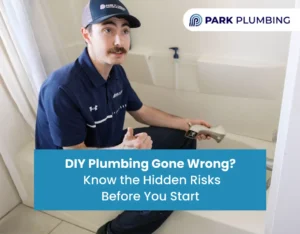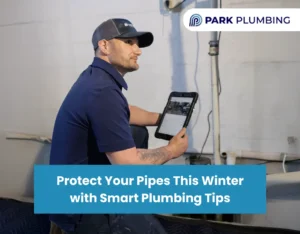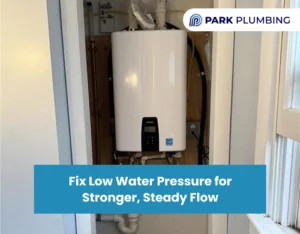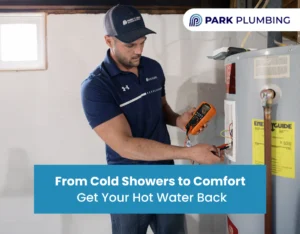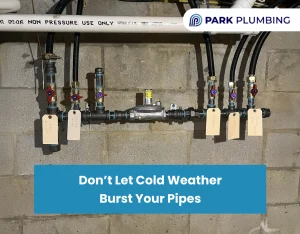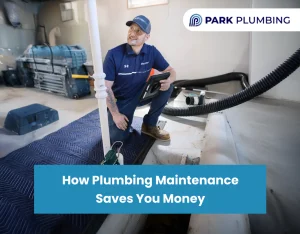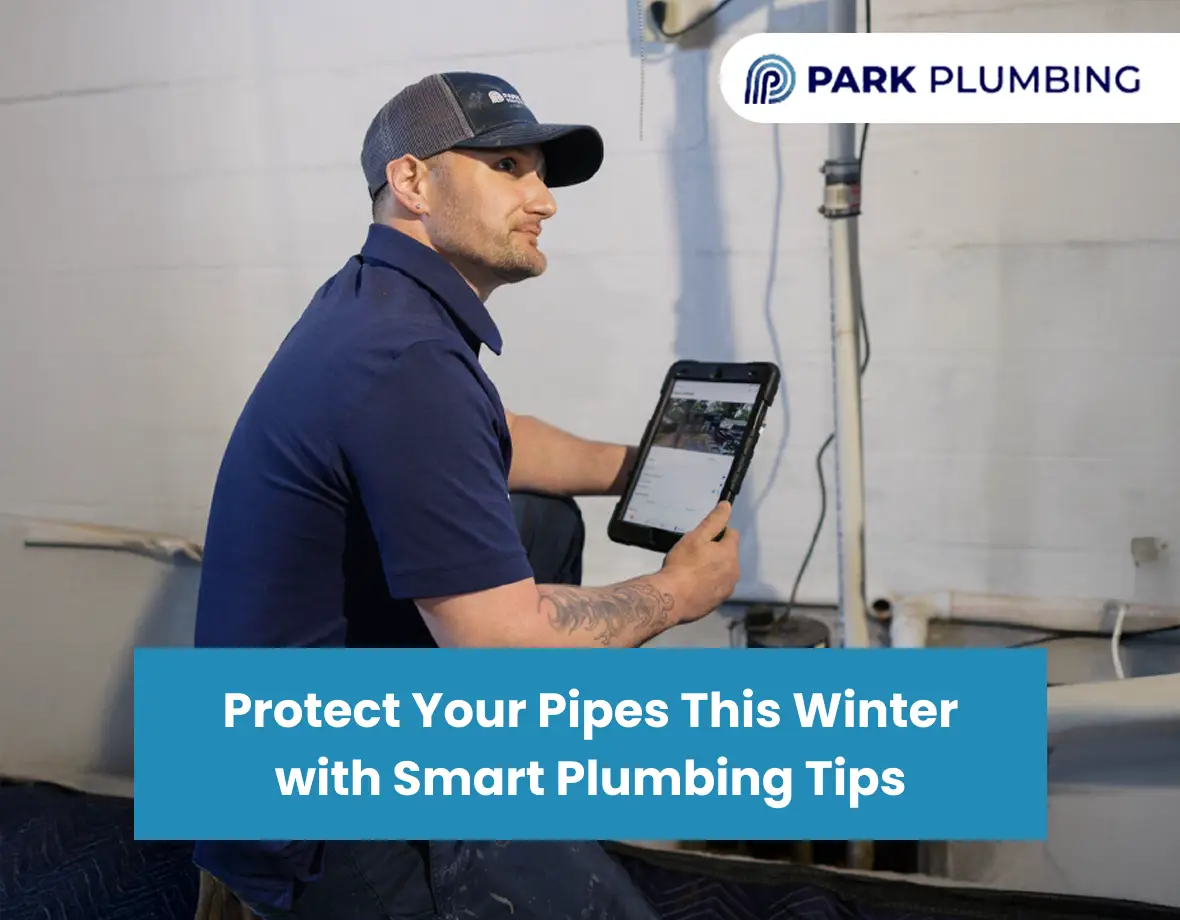
Winter has its charm. Cozy blankets, warm drinks, and holiday lights make the season feel magical. But do you know what is not magical? Waking up on a freezing morning to find that your pipes have burst. A frozen or broken pipe can cause extensive damage, including soaking floors and compromising walls, and result in thousands of dollars in repairs. The good news is that most cold-weather plumbing issues are preventable. With the right plumbing tips and a proactive approach, you can protect your home from unnecessary winter headaches.
Whether you are new to homeownership or have already battled winter plumbing surprises, preparing your pipes before the cold hits can make all the difference.
Why Frozen Pipes Are a Big Deal
Water expands when it freezes. If water freezes inside your pipes, pressure builds until the pipe cracks or bursts. You may not even notice it right away. Sometimes, a pipe will crack when frozen, but the flooding starts only once the ice melts.
A burst pipe is more than a minor irritation. It can damage flooring, drywall, insulation, and personal belongings. Repairs often require both plumbing help and restoration work. This is why winter preparation is not only smart, but also essential.
Keep Indoor Temperatures Consistent
One of the easiest plumbing tips is simply maintaining a steady indoor temperature. Even if you leave home for a few days, do not turn the heat off completely. Rooms like basements, attics, or crawl spaces are more prone to freezing. Warm air may not circulate well in those areas, so take extra care to insulate exposed pipes in those areas.
Insulate Exposed Pipes Before Temperatures Drop
Pipes running along exterior walls or inside unheated spaces are most vulnerable. Pipe insulation sleeves or heating tape can provide an extra layer of protection. These materials are inexpensive compared to the cost of repairing water damage.
A local plumber can identify the most at-risk areas of your home and help properly secure them. You can also search for plumbing services near me to find professional help if you are unsure how to start.
Let Your Faucets Drip on Extremely Cold Nights
Running water is less likely to freeze. You do not need a heavy stream. Just a slow drip is enough to keep water moving. Start by choosing the faucet farthest from your water main. If that faucet keeps water flowing, water will move through the entire system.
This small trick can prevent thousands of dollars in damage. It is one of the simplest and most effective winter plumbing tips.
Open Cabinet Doors Under Sinks
If your kitchen or bathroom sinks are located on exterior walls, open the cabinet doors when temperatures plunge. This allows warm air to circulate around the pipes. You would be surprised at how much of a difference that extra warm air makes.
If your sink is full of cleaning supplies, now is a good time to clear some space so air can flow freely.
Disconnect Outdoor Hoses and Drain Exterior Faucets
Leaving a hose connected during winter traps water in the spigot and pipe. When that water freezes, the pipe can burst inside the wall. Before freezing weather arrives, disconnect all hoses, drain them, and store them indoors.
Also, shut off the water supply to outdoor faucets and open the faucet to drain any remaining water. If you are unsure how to locate the shutoff valve, a residential plumber can point it out and show you how to use it for next season.
Know Where Your Main Shutoff Valve Is Located
When a pipe bursts, time is of the essence. The faster you shut off water to your house, the more damage you will prevent. Ensure that everyone in your household knows where the shutoff valve is located and how to operate it.
This is one of those small tasks that people tend to ignore until they are in panic mode. Taking five minutes to locate the valve today can save hours of stress later.
How to Handle Frozen Pipes If It Happens
Even with preparation, pipes can still freeze. If that happens, here is what you can do
Turn the faucet on. As the ice melts, running water will help clear the blockage. Then gently warm the pipe using a hair dryer, heating pad, or warm towel. Never use an open flame. It is extremely dangerous and can damage the pipe.
If you cannot locate the frozen section or if thawing does not work, contact a local plumber immediately. Winter plumbing issues are time sensitive, and professionals have equipment designed to thaw frozen lines safely.
When You Should Call a Professional Plumber

There are some situations where it is best not to guess or experiment. If you notice low water pressure, strange noises, or a sudden spike in water usage, it could be a sign of a leak or ice buildup.
Professional residential plumbers can:
- Inspect insulation and identify vulnerable pipes
- Winter-proof your plumbing system
- Repair existing leaks before cold temperatures make them worse
If you are unsure who to call, try searching for ‘plumbing services near me’ to find nearby help that specializes in cold-weather plumbing protection.
Winter does not have to be stressful for your plumbing system. With a few preventive steps and simple plumbing tips, you can protect your home from frozen pipes, unexpected leaks, and costly repairs.
If you prefer to hire a professional to prepare your plumbing for winter, the expert team at Park Plumbing is here to help. They provide reliable residential plumbing services throughout Severna Park, Arnold, Annapolis, Edgewater, Pasadena, Crofton, Severn, Gambrills, Crownsville, Bowie, and surrounding areas, and have the knowledge and tools to winter-proof your home’s plumbing system with care and precision. Contact us to learn how we can assist you in protecting your home this winter.
FAQs
How can I prevent my pipes from freezing during winter?
Preventing frozen pipes starts with identifying vulnerable areas such as basements, attics, crawl spaces, and exterior walls. Insulating exposed pipes, maintaining consistent indoor temperatures, opening cabinet doors under sinks, and disconnecting outdoor hoses are effective strategies for maintaining a comfortable indoor environment. Running a slow trickle of water through faucets during extreme cold can also help prevent ice from forming in the pipes.
What are the signs that my pipes may be at risk of freezing?
Some common warning signs include unusually low water pressure, strange noises in your plumbing, ice buildup on visible pipes, or cold spots on floors near plumbing lines. If any of these appear during cold weather, it’s a good idea to take preventive measures immediately or consult a local plumber.
What should I do if a pipe freezes?
If a pipe freezes, turn on the nearest faucet to relieve pressure and allow water to escape as the ice melts. Use safe warming methods, such as a hair dryer, heating pad, or warm towel, to gradually thaw the pipe. Never use open flames, as this is dangerous and can damage the pipe. If thawing is not effective or the frozen section is hard to reach, contact a residential plumber immediately.
Are there specific plumbing areas I should focus on before winter?
Yes. Pipes in unheated areas such as basements, crawl spaces, attics, garages, and along exterior walls are most susceptible. Outdoor faucets, garden hoses, and pipes near drafty windows or doors should also be winter-proofed to reduce the risk of freezing and bursting.
When should I call a professional plumber for winter preparation?
Calling a professional is recommended if you notice leaks, low water pressure, or repeated ice buildup. Residential plumbers can inspect your system, recommend insulation, protect vulnerable pipes, and ensure your plumbing is fully winter-ready. Searching for ‘plumbing services near me’ can help connect you with local experts who can efficiently winter-proof your home.
